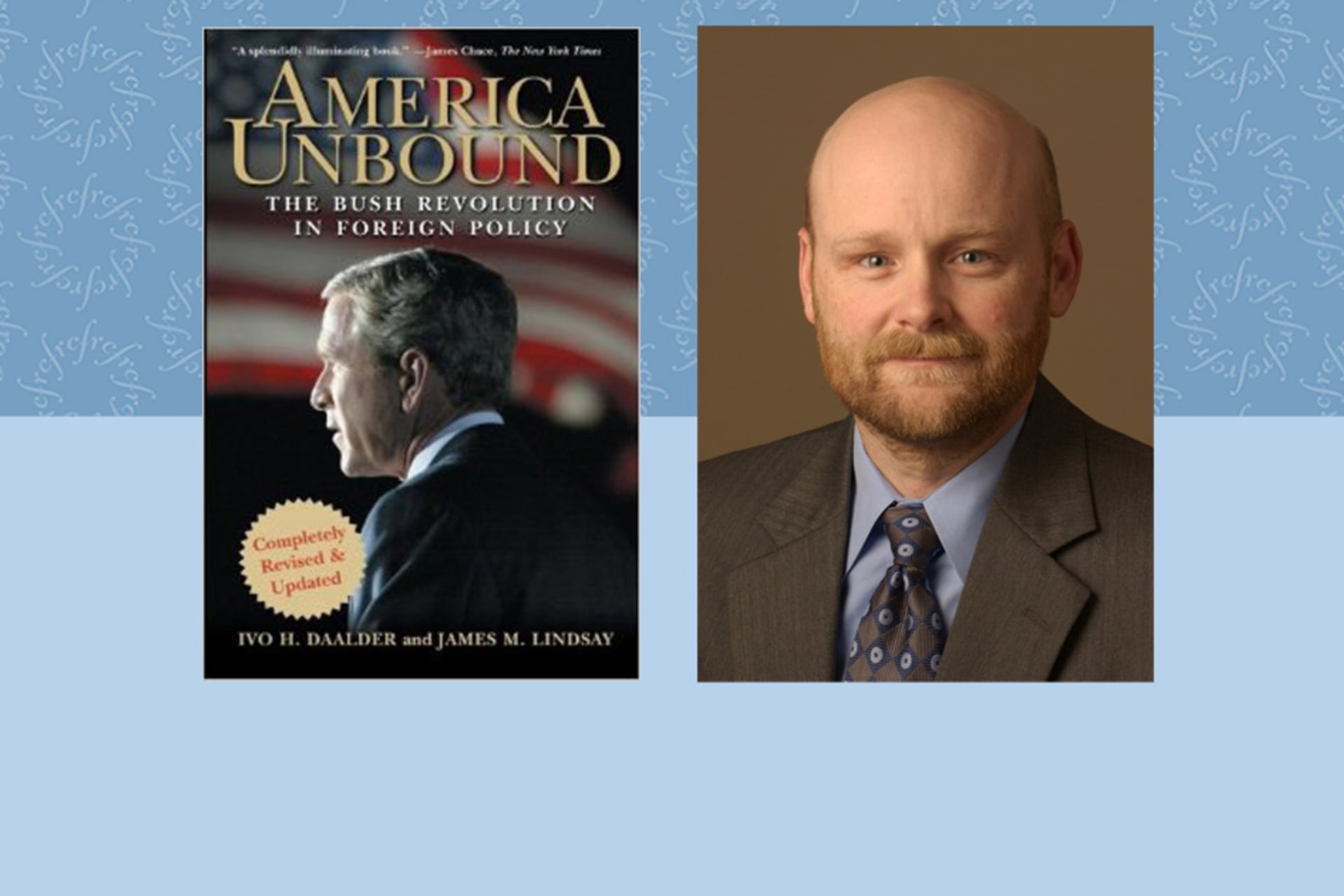America Unbound
In this book, CFR Senior Vice President James M. Lindsay and Ivo H. Daalder argue that President Bush has redefined how America engages the world, shedding the constraints that friends, allies, and international institutions have traditionally imposed on its freedom, insisting that an America unbound is a more secure America. Teaching notes by Dr. Lindsay.

By experts and staff
- Published
America Unbound is a concise, straight-forward, and insightful analysis of the driving forces behind George W. Bush’s foreign policy. It is equally fitting for general courses on American foreign policy, specialized courses on the theory and practice of international relations, and specialized courses on the war or terror or on the current situation in Iraq.
America Unbound will help students in an undergraduate introductory course or an advanced high school class understand how George W. Bush changed the practice of American foreign policy and why the Bush administration made the decisions it did leading up to the Iraq War without overwhelming them with complexity.
For students in an upper-division course, America Unbound provides a comprehensive case study of the worldview that animates the Bush administration and shows how ideas are translated into practice in U.S. foreign policy.
Teaching Notes Components
General Courses on American Foreign Policy
Discussion questions
- Explain the main tenets of President Bush’s foreign policy worldview. Argue for or against this approach.
- To what extent was the Bush revolution in foreign policy a neoconservative revolution?
- How did the events of September 11 change the Bush administration’s approach to foreign policy?
- “Weakness, vacillation, and the unwillingness of the United States to stand with our friends, that is provocative,” argued Vice President Dick Cheney after September 11. “It’s encouraged people like Osama bin Laden . . . to launch repeated strikes against the United States, and our people overseas and here at home, with the view that he could, in fact, do so with impunity” (82). Evaluate the merits of the vice president’s claim.
- Douglas Feith, the third-ranking Pentagon official during George W. Bush’s first term, argues that the “principal strategic thought” underlying the Bush administration’s strategy in the war on terrorism was that “terrorists organizations cannot be effective in sustaining themselves over long periods of time to do large-scale operations if they don’t have support from states” (p. 84). How does this view explain the Bush administration’s policy toward both Afghanistan and Iraq?
- “Tenet [the director of the Central Intelligence] worried that a war in Iraq would stimulate more terrorism and could even lead Saddam to hand over some of his weapons to terrorist organizations” (p. 130). Discuss how the administration evaluated this claim before the war. To what extent did Tenet’s fear come true?
- How did the Bush administration’s handling of the occupation of Iraq change in the first two years after Saddam Hussein’s removal? Were the difficulties that the administration encountered inevitable or the result of flawed strategy?
Debate
- Did George W. Bush and his national security team deliberately mislead the country into war with Iraq?
- On balance, has George W. Bush’s approach to foreign policy made the United States more or less secure?
- Are unilateralism and ad hoc coalitions of the willing preferable to multilateralism and formal international institutions?
Mock National Security Council Meeting
- Assign the various positions on the President’s National Security Council team. Reenact the internal administration discussions that occurred between August 2002 through March 2003 over whether to take the Iraq issue to the United Nations and then over the failed diplomatic effort to secure a UN vote explicitly authorizing war against Iraq. Focus on the influence of various advisers on President Bush’s decisions.
Advanced Courses in the Theory and Practice of International Relations
Discussion questions
- The authors assert that President Bush’s revolution was not a revolution in America’s goals abroad, but rather in how to achieve them. How have foreign policy methods changed under President Bush’s leadership? How did he redefine key principles?
- Explain the hegemonist worldview. What distinguishes neoconservatives (or democratic imperialists) from assertive nationalists?
- Explain and evaluate the hegemonist critique of international law and multilateral institutions.
- Compare and contrast George W. Bush’s foreign policy doctrine with that of other American administrations.)
- Explain the influence of the group known as the Vulcans on the President’s decision-making.
- Evaluate how the Bush administration’s notion that nation-states are the key actors in international politics shaped its strategy on fighting terror.
- Track the evolution of the administration’s doctrine of preemption and its impact on policy decisions. Evaluate its desired and undesired effects and consider whether it is still valid or necessary today. Discuss the distinction (or lack thereof) between prevention and preemption.
- Did George W. Bush change his approach to foreign policy at the start of his second term in office?
- To what extent did domestic political considerations guide George W. Bush’s handling of foreign policy?
- George W. Bush came to the White House promising to be a CEO president. To what extent should future presidents emulate his approach to the job?
Mock World Diplomacy Session
- Reenact the debate that took place in the weeks before and after the passage of UN Security Council Resolution 1441 on November 8, 2002. Assign roles, both from the Bush administration and foreign governments. Each student must determine the “goals” of his or her character with the help of the book and contemporary articles. Examine alternative methods and timing, while staying in line with each character’s motivations. How would these have led to different outcomes? America Unbound mentions at least one alternative scenario: the earlier pursuit of a second resolution. How would that scenario have played out?